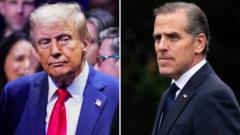Recent events surrounding the legal challenges faced by President Joe Biden and former President Donald Trump have drawn attention to the uncomfortable similarities in their narratives regarding prosecution. Biden's decision to issue a "full and unconditional" pardon for his son, Hunter Biden, has ignited discussions about the potential politicization of justice, mirroring the arguments made by Trump during his ongoing legal woes.
In his announcement, Biden portrayed his son’s prosecution as an unfair attack, stating, “No reasonable person who looks at the facts of Hunter’s cases can reach any other conclusion than Hunter was singled out only because he is my son – and that is wrong.” This sentiment echoes Trump's rhetoric surrounding his own legal challenges, especially the high-profile case in New York relating to hush-money payments which resulted in his conviction for falsifying business records.
Throughout the years, both figures have faced criticisms alleging selective prosecution aimed at damaging their political reputations. Republican Senator Lindsey Graham, known for his allegiance to Trump, controversially labeled the hush-money trial as an "outrage," branding it political persecution.
Upon closer examination, the circumstances of Hunter Biden's legal issues and Trump's hush-money incident reveal notable parallels. Both cases were pursued in 2024, years after the events took place, with Trump’s alleged violations stemming from 2016 and Hunter's issues spanning from 2016 to 2020. The apparent shifts in legal trajectories left observers questioning whether genuine justice was being served or if political agendas were at play.
Despite the evident parallels, key distinctions exist between the two scenarios, primarily in their public offices and the severity of offenses. However, both Biden and Trump have capitalized on their narratives to highlight perceived double standards in the judicial system, as critics sense that the scales of justice might favor the privileged.
Legal experts, including Kevin McMunigal, have pointed out that public perception of selective prosecution may not accurately reflect the complexities of the decision-making process behind criminal charges. Many criminal statutes remain on the books but see little enforcement, leading to a widespread misunderstanding of how justice is administered.
Ultimately, the implications of Biden's pardon for Hunter could resonate with Trump's legal trajectory, as both navigate the murky waters of a polarized political landscape. As the public grapples with issues of trust in governmental institutions and alleged judicial biases, the ongoing narratives of both Bidens and Trumps continue to intertwine, threatening to shape perceptions of power and accountability within an already strained democracy.



















